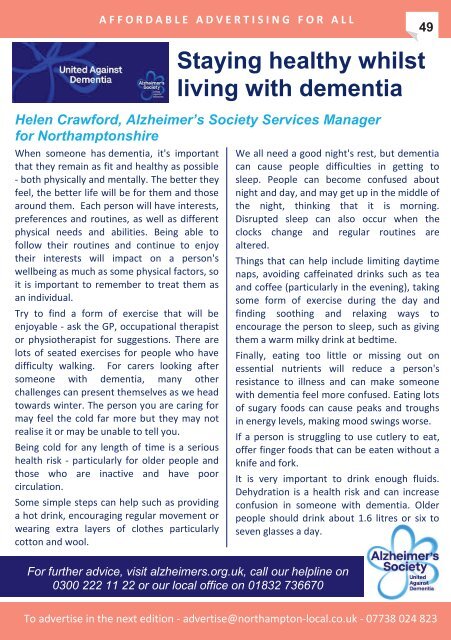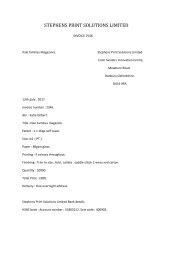You also want an ePaper? Increase the reach of your titles
YUMPU automatically turns print PDFs into web optimized ePapers that Google loves.
A F F O R D A B L E A D V E R T I S I N G F O R A L L<br />
Helen Crawford, Alzheimer’s Society Services Manager<br />
for Northamptonshire<br />
When someone has dementia, it's important<br />
that they remain as fit and healthy as possible<br />
- both physically and mentally. The better they<br />
feel, the better life will be for them and those<br />
around them. Each person will have interests,<br />
preferences and routines, as well as different<br />
physical needs and abilities. Being able to<br />
follow their routines and continue to enjoy<br />
their interests will impact on a person's<br />
wellbeing as much as some physical factors, so<br />
it is important to remember to treat them as<br />
an individual.<br />
Try to find a form of exercise that will be<br />
enjoyable - ask the GP, occupational therapist<br />
or physiotherapist for suggestions. There are<br />
lots of seated exercises for people who have<br />
difficulty walking. For carers looking after<br />
someone with dementia, many other<br />
challenges can present themselves as we head<br />
towards winter. The person you are caring for<br />
may feel the cold far more but they may not<br />
realise it or may be unable to tell you.<br />
Being cold for any length of time is a serious<br />
health risk - particularly for older people and<br />
those who are inactive and have poor<br />
circulation.<br />
Some simple steps can help such as providing<br />
a hot drink, encouraging regular movement or<br />
wearing extra layers of clothes particularly<br />
cotton and wool.<br />
Staying healthy whilst<br />
living with dementia<br />
49<br />
We all need a good night's rest, but dementia<br />
can cause people difficulties in getting to<br />
sleep. People can become confused about<br />
night and day, and may get up in the middle of<br />
the night, thinking that it is morning.<br />
Disrupted sleep can also occur when the<br />
clocks change and regular routines are<br />
altered.<br />
Things that can help include limiting daytime<br />
naps, avoiding caffeinated drinks such as tea<br />
and coffee (particularly in the evening), taking<br />
some form of exercise during the day and<br />
finding soothing and relaxing ways to<br />
encourage the person to sleep, such as giving<br />
them a warm milky drink at bedtime.<br />
Finally, eating too little or missing out on<br />
essential nutrients will reduce a person's<br />
resistance to illness and can make someone<br />
with dementia feel more confused. Eating lots<br />
of sugary foods can cause peaks and troughs<br />
in energy levels, making mood swings worse.<br />
If a person is struggling to use cutlery to eat,<br />
offer finger foods that can be eaten without a<br />
knife and fork.<br />
It is very important to drink enough fluids.<br />
Dehydration is a health risk and can increase<br />
confusion in someone with dementia. Older<br />
people should drink about 1.6 litres or six to<br />
seven glasses a day.<br />
For further advice, visit alzheimers.org.uk, call our helpline on<br />
0300 222 11 22 or our local office on 01832 736670<br />
To advertise in the next edition - advertise@northampton-local.co.uk - 07738 024 823
















